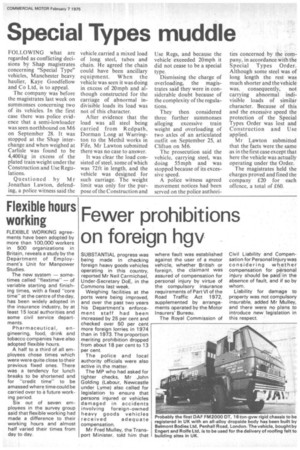Fewer prohibitions on foreign hgv
Page 25

If you've noticed an error in this article please click here to report it so we can fix it.
SUBSTANTIAL progress was being made in checking foreign heavy goods vehicles operating in this country, reported Mr Neil Carmichael, Under-Secretary DoE, in the Commons last week.
Weighing facilities at the ports were being improved, and over the past two years his Department's enforcement staff had been increased by 25 per cent and checked over 50 per cent more foreign lorries in 1974 than in 1973. The proportion meriting prohibition dropped from about 18 per cent to 13 per cent.
The police and local authority officials were also active in, the matter.
The MP who had asked for tighter checks, Mr John Golding (Labour, Newcastle under Lyme) also called for legislation to ensure that persons injured or vehicles damaged in accidents involving foreign-owned heavy goods vehicles received adequate compensation.
Mr Fred Mulley, the Transport Minister, told him that where fault was established against the user of a motor vehicle, whether British or foreign, the claimant was assured of compensation for personal injury by virtue of the compulsory insurance requirements of Part VI of the Road Traffic Act 1972, supplemented by arrangements operated by the Motor Insurers' Bureau.
The Royal Commission of
Civil Liability and Compensation for Personal Injury was considering whether compensation for personal injury should be paid in the absence of fault, and if so by whom.
Liability for damage to property was not compulsory insurable, added Mr Mulley, and there were no plans to introduce new legislation in this respect.












































































































































